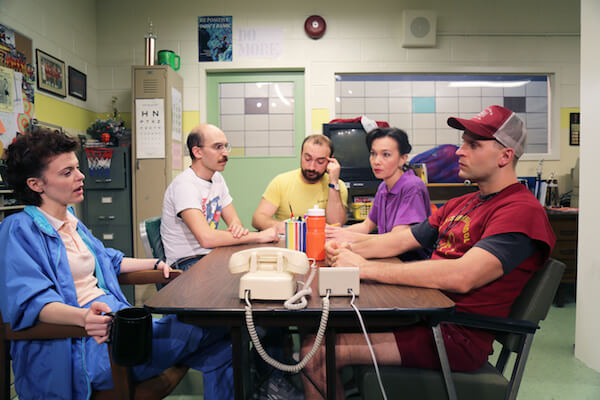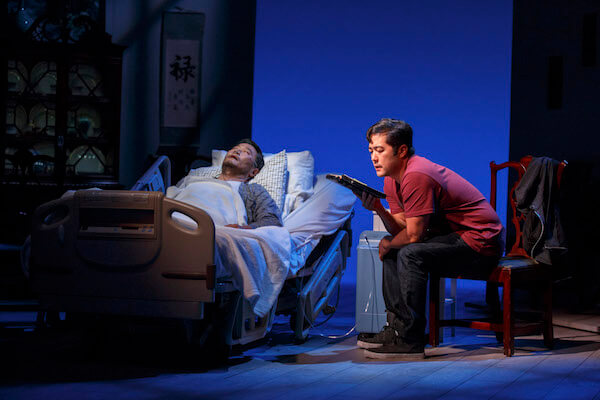Ian Harvie, Talene Monahon, Dolly Wells, Jesse Tyler Ferguson, and Phillip James Brannon in Jordan Harrison’s Log Cabin,” directed by Pam MacKinnon, at Playwrights Horizons through July 15. | JOAN MARCUS
The intrepid Playwrights Horizons has ventured into uncharted territory with “Log Cabin,” a visionary, caustic drama that raises prickly issues about gender, race, friendship, and plenty more.
Just in time for LGBTQ Pride Month, the play, written by openly gay Jordan Harrison (“Marjorie Prime,” “Maple & Vine”), focuses on the T stripe of the community. Until very recently, transgender folks have been largely ignored by playwrights, and “Log Cabin” embodies one of the reasons why. They are a diverse, misunderstood group of people not easy to get a ready handle on, even by so-called liberals who should know better.
The play, set in a stylish Brooklyn abode during the years leading up to the pivotal — many say apocalyptic — 2016 presidential election, examines the dynamics between a lesbian couple (played by Cindy Cheung and Dolly Wells) and a gay male couple (Jesse Tyler Ferguson and Phillip James Brannon), both in long-term, committed partnerships that later spawn offspring. But when a trans man (Ian Harvie) and his girlfriend (Talene Monahon) enter the mix, lives get strewn into disarray.
Jesse Tyler Ferguson, Jordan Harrison discuss new play exposing biases we didn’t know we had
The piece is directed by Pam MacKinnon, Tony winner for “Who’s Afraid of Virginia Woolf,” which also centers on an ugly clash of couples fueled by pent-up rancor and booze. “Log Cabin” is wildly different in that it veers into satiric terrain, where infants are portrayed by adult actors and speak with the intelligence of a psychology professor.
For his part, Ferguson was instantly drawn to the role of Ezra (the more outspoken half of the gay couple) and the timely, challenging nature of the play. Plus, he was thrilled it fit neatly into his short hiatus from filming “Modern Family.”
“It’s in my wheelhouse, I know how to play a gay man,” he said with a chuckle during a recent phone conversation. “I’ve been doing it my whole life. There’s something exciting about [playing Mitchell] on a TV show that’s so wholesome, but then playing someone with a more complicated, darker nature. He says a lot of things that are shocking and polarizing. It’s a wildly different character.”
Ferguson loves that the play takes audiences to uncomfortable places, but does so in a way that’s very smart and entertaining.
In an interview soon after previews began, Harrison described how the play traces the breakdown of empathy among various subgroups within the LGBTQ community.
“After people get their own rights, they have a tendency to forget about the rights of those coming up behind them,” he observed.
Ferguson certainly understands the value of empathy, having been a visible force in the fight for marriage equality nationwide.
“After we won, we were patting each other on the back, it was a huge accomplishment that deserved celebration,” he recalled. “But the next day we had to get back to work to protect those rights. There are places in America where you can get married on Saturday and get fired from your job on Monday. I refuse to be one of those people getting into the lifeboat and ignoring those on the sinking ship.”
Ferguson pointed out that his husband, Justin Mikita, is on the board of the Human Rights Campaign, which strives to address the needs of the trans community. But most of the board members do not know firsthand what it’s like to be trans, so it can be challenging.
“I understand now what my parents went through when I came out,” Ferguson said. “They didn’t understand what it was like to be gay and, through my teenage angsty eyes, I got frustrated. But they tried their best. By acknowledging that struggle, we can find common language. This play addresses that.”
Phillip James Brannon and Jesse Tyler Ferguson in “Log Cabin.” | JOAN MARCUS
The play portrays trans issues in ways rarely, if ever, before seen onstage. During an ill-fated gathering of the three couples, a debate erupts over the term “cis” that might make some cisgender folks squirm (I sure did).
As Harrison tells it, he was inspired to write about trans rights when he started hearing snide comments that queer friends would make about trans people when they weren’t in the room. There were frustrations with pronouns and confusion about changing rules of what was acceptable.
“It reminds me of talk I remember hearing early in my life,” Harrison explained. “People would say, ‘Why did you have to ruin a perfectly good word like gay.’ In some ways we are becoming the previous generation.”
“It felt strange to live my whole life without the term ‘cis’ and then be told that’s what I am,” Harrison continued. “That lumps me into a category with all the horrible people who made me feel different. It felt like some of my history had been eradicated. Obviously, that’s not the goal of the trans movement. We need to be aware of how we trigger each other. We need to honor each other.”
These days, trans rights are under attack, such as the freedom to access appropriate bathrooms and the right to serve in the military. The play addresses the need to understand views from a trans person’s perspective.
Harrison cast Ian Harvie, who is transgender, in the role of a trans person. Was that a requirement for the role?
“Frankly, at this point it’s unimaginable not to cast a trans person in a trans role,” Harrison said. “If the TV show ‘Transparent’ [which originally starred Jeffrey Tambor] was recast today, I’d be surprised if a cisgender person was chosen.”
During the eye-opening first table read, Ferguson was grateful that Harvie was so open about his own struggle, even admitting to a couple of biases of his own.
“We all carry biases and preconceived notions about other subcultures within the LGBT community,” said Ferguson. “I found myself tip-toeing around questions with Ian. But then I realized, I don’t want people to do that with me so why am I doing that with him? As long as we’re having a dialogue, that’s the most important thing. That fear of asking questions and fear of offending someone is when it can get harmful.”
Harrison agrees, noting that Harvie is not only masterful in the role, he was a treasured trans voice in the rehearsal room. It was essential to have his perspective in the conversation. What’s more, he learned a bit of lingo, “deadnaming,” which refers to calling a trans person by their former name.
The 41-year-old playwright has described “Log Cabin” as a period piece, even though it takes place only a few years ago. He wrote the first draft right before the 2016 election, at the peak of the Obama administration’s glory years.
“Conversations early in the play reflect the new invigoration in 2012 that the world is starting to look brighter, with more states recognizing gay marriage,” he said. “There is a level of comfort and safety. At the end of the play, the fissures between the trans person and his friends are not so large, because there’s a greater threat now lurking in the White House.”
And then there’s the play’s cryptic title. Although the characters are not exactly card-carrying Log Cabin Republicans, they do harbor conservative impulses that are exposed.
“In a heated moment, Ezra says this country has gotten too liberal. I titled it ‘Log Cabin’ because I want the idea to simmer as a possibility,” said Harrison. “They are still rooting for Hillary on election night, but there are different shades in liberalism. It’s an intentionally slanty title.”
According to Harrison, Ezra is loosely modeled after himself, once a dorky queer kid slammed into lockers, an underdog. Now, he has entitlements that not everyone has and has gotten cocky.
“I feel extremely fortunate to be played by an incredible actor like Jesse,” Harrison said. “Not only is he extremely nimble with great comic chops, but he has an energizing effect on the company. He is a real morale builder, a burst of sunshine in the room.”
LOG CABIN | Playwrights Horizons Mainstage Theater | 416 W. 42nd St. | Through Jul. 15: Tue.-Wed. at 7 p.m.; Thu.-Sat. at 8 p.m.; Sat. at 2:30 p.m.; Sun. at 2:30 &7:30 p.m. | $59-$99 at playwrightshorizons.org | One hr., 25 mins., with no intermission




































